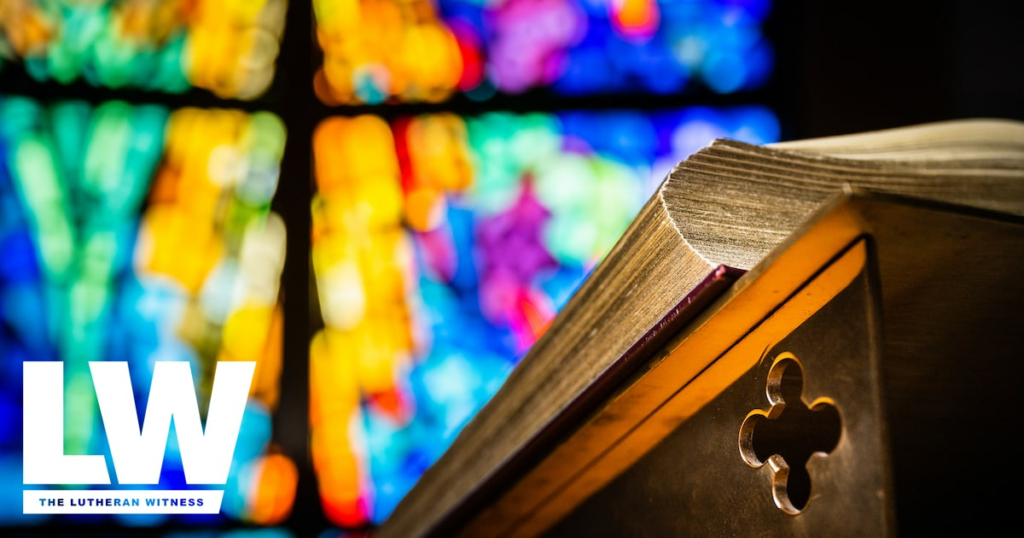by Dr. Beverly Yahnke
In most churches, as we gather each Lord’s Day, we recite either the Apostles’ Creed or the Nicene Creed. We find both joy and certainty in our profession of faith. We speak the words with confidence, binding ourselves to one another within the Body of Christ and worshiping our God who has created, redeemed and sanctified us. We teach our children the creed at home, in the Christian day school and at church until the words are woven into their hearts and souls for all time.
Just as the church has been devoted to catechizing its young for centuries, our culture catechizes its young as well. The church uses the catechism, Holy Scripture and the Confessions to serve its holy task. The pop culture uses every possible sensory modality to captivate us with the amorality and twisted virtues of the media, politics, celebrity and the cyber-universe. Many children marinate in that culture from waking until rest each day.
As they continue to be exposed to the pop culture, it intrudes insidiously into every element of their lives and routinely challenges the faith into which they were baptized. We live in a post-Christian culture that prefers our children adopt a new and horribly reckless creed.
The new creed teaches that all beliefs are equally good and that what is true for one person may not be true for another, for there are no universal truths. (I believe in tolerance for and acceptance of all ideas and truths, even those that are false or profane.) The new creed trivializes life that is unborn or inconvenient. (I believe that life is mine to live as I choose. I own my body and may start and end life as it suits me.) The new creed is prepared to sacrifice nearly everything in the quest for happiness. (I believe that the pursuit of happiness is my essential right and primary objective in life.)
The new creed cultivates rampant narcissism as an ultimate style of personal expression, using countless celebrity tutorials in excess and self-absorption. (I believe that I am special and am entitled to meet my own needs, often at the expense of others.) The culture’s creed despises God and His gifts and encourages whatever idolatry seems to meet one’s purposes. (I believe that the Christian faith is practiced by unenlightened others who are incapable of being self-reliant.) The new creed also professes that fallible people can vote to determine what we must all accept as moral personal behavior. (I believe that the majority opinion shall inform my conscience and my behavior in all matters.)
The culture’s creed is toxic, and it may well discourage children from embracing God’s truths and a life of faith. The culture has no knowledge of sin before God, no knowledge of the need for confession and redemption. It surely has no concept of our total reliance on the mercy of God the Father in the sacrifice of His Son, Jesus, for the sins of the whole world.
I prefer the creed taught to me by my mother, who learned it from a faithful Lutheran pastor. It is the same creed recited throughout centuries of the church. It is the creed learned by one child at a time.
Children are not self-sufficient, eternally resilient and simply in need of opportunities to learn their “personal truth.” Children require godly parents and grandparents who are guardians of the truth. Children brought into God’s family in the holy washing of water and the Word participate in the culture of faith. Children grow and thrive in the culture of faith, insulated from pop culture until their spiritual maturity and parental wisdom allows them to explore faithful responses to the pop culture’s chronic temptations.
How do we protect children from Satan’s clever use of cultural carrots tempting them to misbelief and unbelief?
- Parents are nurtured regularly by God’s Word and Holy Sacrament, equipping them for their tasks in a culture of faith. They become “doers of the Word.”
- Parents are informed guardians for their children, becoming aware of cultural temptations and trends, learning how their children can be protected from harmful media and cyber-influences. It is hard to protect against threats of which one is unaware.
- Parents encourage their child’s exploration of this world, yet establish boundaries unapologetically. Parents seek guidance and counsel from their pastors and other Christian parents in the community of faith.
In this age as in ages past, Christian parents wrap themselves and their families in prayer, believing our Lord’s promise that He will equip them thoroughly for the doing of His will. Faithful parents remain vital embodiments of Christian virtue and counter-cultural truth, teaching what the true creed of the Christian faith looks like in action . . . one day at a time.
—
> According to Pew Forum, “Americans ages 18 to 29 are considerably less religious than older Americans.”
About the Author: Dr. Beverly Yahnke is the chair of Social Sciences at Concordia University Wisconsin and executive co-director of Doxology.
October 2011






